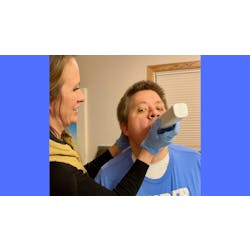By Mark Hartley
Within the last few years, serious journalists at The Wall Street Journal have somewhat mockingly timed the action at football and baseball games. It turns out that the hours spent watching a game consists of just 11 to 18 minutes of actual action. No, they are not talking about commercial breaks, although that's part of the idle waiting involved. It's all of the preparation involved before a series of movements that last just seconds. How many different ways can a baseball player spit before stepping into the batter's box? Do the 11 young men in a football huddle need to recite both Psalms and Luke before returning to the line of scrimmage?
What I'm really afraid of -- because I have gotten used to viewing 15 minutes of sports action spread across two to three hours -- is that The Wall Street Journal will some day measure the efficiency of professional conferences.
"OK, here we go," one journalist says, pulling out the stopwatch. "This hygienist just traveled four hours to this conference, and spent 12 more hours dining and sleeping in a hotel. She's walking up to the booth for this exhibitor … start the stopwatch … she is waiting for the exhibitor to walk over to her … he does … She asks if he has any samples … He hands her one. He asks if she has a question ... she doesn't ... She thanks him for the sample, and she is turning away. OK, that's 1 minute and 45 seconds of action. I'm recording this in the notebook."
The second journalist spins into action. "This doctor traveled six hours to the conference. He, too, spent 15 hours in a hotel and two restaurants before arriving at the conference this morning. He's studying a painting on the wall … Now he's studying that poster that lists all of the courses in this room today. … Does that count? No, he knew this was the seminar he was attending? OK. … He checks his cell phone. Maybe he's turning it off … Does that count? No? OK … He puts it in his pocket. … He's heading into the seminar. I'm starting the stopwatch … Wait! I'm stopping it. He is stepping back out into the hallway … Phone must have vibrated on him. So far, the doctor has 25 seconds of action at this conference."
Everywhere around us, experts urge us to make efficient use of our time. We are asked to evaluate whether maximum personal development, time management, and fiscal control were derived from any endeavor.
Are dental conferences worth it? I think they are. In a world dominated by semi-blind interaction through social media, texting, and email, it still means something to have direct contact with your peers.
You can interact with a seminar presenter either when the audience is asked if there are questions, or immediately afterward when everyone else heads for the exit. Exhibitors can be frank too. Yes, they are always hoping for a sale. But they will talk candidly about the application of a product in a specific situation, sharing what they have learned from their interactions with dental professionals at other conferences. So many light bulb moments occur when you meet a new colleague in the profession. You introduce yourself, compare notes, and identify similar frustrations, before saying goodbye until next time as friends, not strangers.
Dental hygiene's season of meetings is upon us. The ADHA's annual session convenes later this month in Las Vegas. The RDH Under One Roof conference opens in Chicago in August. Both venues do a great job of staging "hygiene only" events that foster many professional growth opportunities.
My bucket list is probably influenced by what I do for a living. I'll read notices about conferences completely unrelated to dentistry. A seminar or networking event will catch my eye, and I think: When I retire, I might do go to that conference. It would not be to launch a second career or even to become more "well-rounded" for this one. I possess a curiosity for other people and what they do with their lives, and I have met many hygienists who have the same sentiment about the patients they treat.
Yes, I have encountered guests at dental conferences who have no plausible reason for being there. They just wanted to embrace the unfamiliar world of dentistry and take something away from it.
The sheer joy of being inspired by a new idea makes up for any inefficiency associated with attending a conference. The Wall Street Journal doesn't have to time my spurts of action at these meetings. They remain a very efficient use of my time, and are vitally critical for all of us who attend.
Mark Hartley
[email protected]
Follow RDH on Facebook
Past RDH Issues




